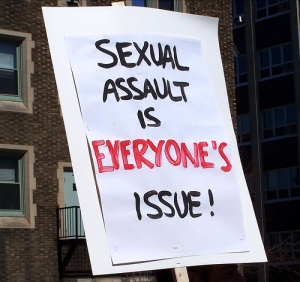http://ocrcc.org/the-intersection-of-sexual-violence-and-disability/
(content warning: sexual assault)
With the current statistics of people that will be sexually assaulted in their lifetime in the United States, it is not difficult for one to imagine family members, friends, and acquaintances being affected. Current campaigns about sexual assault have attempted to familiarize the crime by portraying mothers, sisters, daughters, etc. as survivors. The thought process behind these campaigns is that if we can imagine loved ones being affected, our preventative efforts will be strengthened and we will begin to chip away at the stigma survivors face when they tell their stories. While this personalized lens through which one can view sexual assault is not necessarily inherently bad, it is not effective in allowing us to extend empathy to survivors of sexual assault who are complete strangers. We often express hostility toward people we don’t know when they come forward and attempt to tell us what they’ve been through. We must cultivate an environment of acceptance and respect for survivors, whether or not their lives are of personal relevance to our own.
Recent sexual assault cases involving celebrities that have a high profile on social media have generated fairly nasty responses toward the affected persons. Singer/songwriter Kesha’s request to no longer be bound by her contract with Sony’s Dr. Luke was denied because she apparently was unable to provide sufficient evidence. Despite the numerous professions of support and love by fans and fellow celebrities, very few of her male counterparts have spoken up on her behalf, and some have even questioned her honesty in coming forward. Why do some so vehemently insist on her dishonesty when they could be extending support? Is she not someone’s friend? Is she not someone’s daughter? Even though the vast majority of us do not share a personal relationship with Kesha, that is not a reason for us to leave her and people in similar situations behind when we discuss sexual assault.
Additionally, despite the fact that approximately 50 women have accused Bill Cosby of assaulting them, celebrities and fans alike are unwilling to acknowledge their testimonies, which has me wondering: what does it take for us to believe that someone is being truthful? I doubt very much that we would react the same way if a family member or friend confided in us that they had been violated, and we should respond the same way to people that we don’t know. While I am not suggesting that we adopt a mindset of “guilty until proven innocent,” I do believe that it is equally harmful to perpetuate an atmosphere of unshakeable distrust when survivors attempt to get recognition.
Of course, the way that we react to survivors does not come without consequence. Sixty-eight percent of sexual assaults in the United States go unreported. Berating the people who speak about their experiences creates a society that encourages staying quiet when somebody has been hurt, and that is absolutely unacceptable. It is imperative that we strive to be welcoming, attentive listeners whose only goal is to help. When we tell strangers that we don’t believe them, we essentially are saying that they would have been better off not saying anything at all. The campaigns that only place emphasis on family members and friends, while certainly made with good intentions, are suggesting that a survivor needs to be someone that we know for them to be important. That implication certainly isn’t the case, and to eradicate it we must both recognize the humanity in every single survivor, no matter how we know or don’t know them, and we must also foster a more welcoming environment for those who are brave enough to share their stories. We should care about survivors because they are people, and we need to remember that fact when we discuss the cases of strangers.
image link: http://ocrcc.org/the-intersection-of-sexual-violence-and-disability/



Pingback: An Abuser is Coming to a Theater Near You | University of Minnesota Women's Center Blog